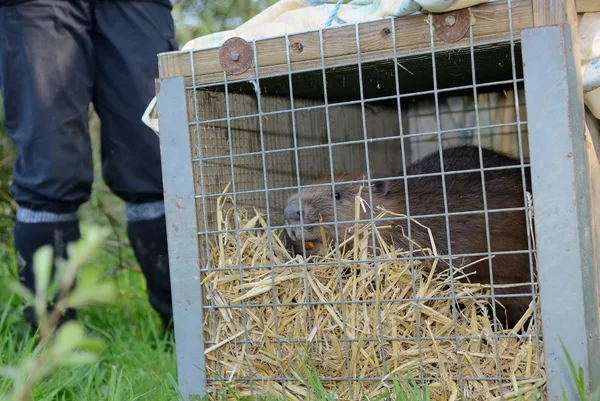A charity which pioneered the reintroduction of beavers is now calling for greater clarity and urgency from the Government in relation to its national plans for the widespread return of the animals.
Devon Wildlife Trust says it welcomes the recent announcement from Government that Eurasian beavers will be given legal protection in England from 1st October 2022, and the publication of guidance in early September which outlines how beavers might be managed in the future.
However, the charity is concerned that the proposals lack ambition and detail. It warns that, in their current form, they will not deliver the widespread reintroduction of a species which scientific studies have shown can improve water quality in rivers, stabilise water flows during times of drought and flood, store carbon and boost other wildlife.(1)
Harry Barton is Devon Wildlife Trust’s Chief Executive. In 2015 the charity led a successful trial on the River Otter in Devon where England’s first wild population of beavers were reintroduced – 400 years after their extinction due to hunting and habitat loss. This trial was a great success and the Government subsequently agreed that the beavers on the River Otter could remain in the wild and spread naturally to other rivers. Harry said:
“A summer of record-breaking heat and drought has highlighted the urgency of making our landscapes more resilient to the unfolding climate emergency. Beavers have created green oases in our parched river valleys, because of their ability to store water through dam building and wetland creation. And we know they can reduce peak flows in times of flood and help improve water quality.
The Government’s recent announcements on protection for beavers and their management are good news, but they lack clarity and a sense of urgency. We need a clear plan and timetable so these amazing animals can become part of the wildlife of rivers throughout England.”
The Wildlife Trusts and Beaver Trust is backing this call in a letter to Ranil Jayawadena, Secretary of State for Environment, Food and Rural Affairs. This asks Government to make five key actions to ensure beaver reintroductions can take place on a scale and at a pace which will bring maximum advantage to wider society. These actions include:
- Publishing an ambitious strategy and timeline for beaver reintroduction in English river catchments.
- Reconsidering the proposals for funding beaver releases into the wild. At present these impose prohibitive levels of upfront costs on groups wanting to reintroduce beaver populations.
- Establishing a system of financial support which will reward the farmers and landowners who provide space for beavers and their wetlands.
- Putting in place and then resourcing a network of Beaver Management Groups across England to support farmers, landowners and local communities as new beaver populations become established.
- Confirming the futures of existing wild living beaver populations (including the Tamar in Devon and the Stour in Kent) outside of the River Otter, Devon.
Sandra King, Chief Executive of Beaver Trust, commented:
“Beavers bring such an astonishing array of ecosystem services to our landscape, this truly is an historic day for the species in England. It is thanks to the hard work and determination of pioneering individuals and wildlife organisations that the recovery of this once-native animal is able to celebrate this milestone.
“It remains urgent and vital that the Government delivers a clear, ambitious policy and licensing guidance to support beaver restoration in the wild. At the end of the day, if we are to welcome beavers back as a native animal our primary objective must be to target positive coexistence with beavers. A properly resourced, forward looking strategy will enable land managers and communities to do this.”
Ali Morse, water policy manager of The Wildlife Trusts, says:
“The Government’s recent consultation on the future of beavers in England showed significant support for their widespread reintroduction. Of more than 3,000 responses nearly 70% were positive about Defra’s plans for the return of beavers. Even among the minority who objected the most common reason given was that the pace of Government plans for their return was too slow! (2)
The return of beavers to rivers across England has public support and is line with the Government's own commitments enshrined in its 25-year Environment Plan and the legally binding target of its Environment Act 2021 to halt nature’s decline. What we need now is action.”
Beaver female - Photo credit Mike Symes
- River Otter Beaver Trial: Science and Evidence Report > CLICK HERE
- Consultation Outcome: summary of responses and next steps regarding the Government’s public consultation on the approach to the reintroduction of beavers in England> CLICK HERE

.JPG)
.JPG)
.jpg)


















